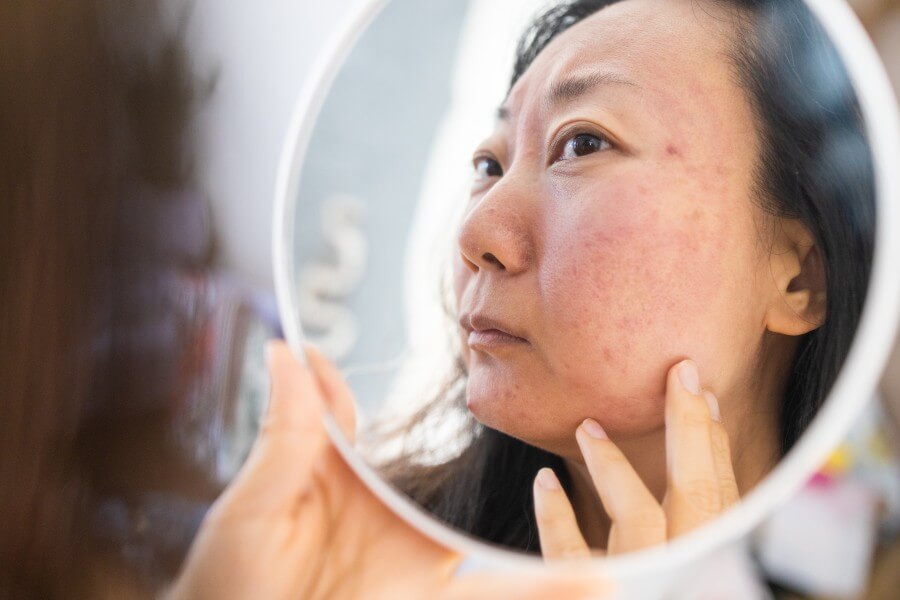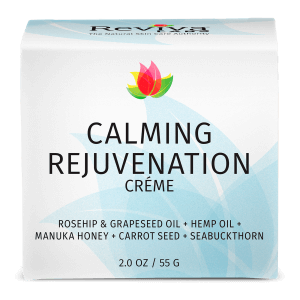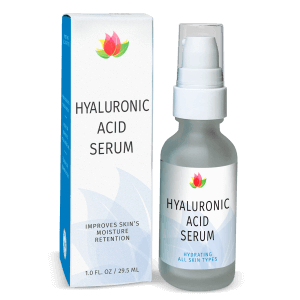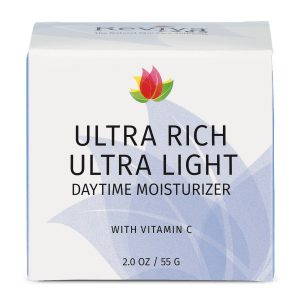Reviva Labs, Skin Care
5 Simple Ways To Treat Damaged Skincare Barrier
The skin barrier, also known as the stratum corneum, is the outermost layer of your skin. It serves as the first line of defense against environmental aggressors, such as pollution, UV radiation, and bacteria. When this barrier is damaged, your skin can become dry, irritated, and more prone to infections. Maintaining a healthy skin barrier is crucial for overall skin health.
A damaged skin barrier can be caused by various factors, including over-exfoliation, harsh skincare products, and environmental stressors. When the skin barrier is compromised, it loses its ability to retain moisture and protect against harmful substances. This can lead to a range of skin issues, from redness and sensitivity to breakouts and eczema.
Fortunately, there are simple and effective ways to repair and strengthen your skin barrier. By incorporating these methods into your skincare routine, you can help restore your skin’s natural defenses and achieve a healthier, more resilient complexion.
Gentle Cleansing
One of the most important steps in repairing a damaged skin barrier is to use a gentle cleanser. Harsh cleansers can strip the skin of its natural oils, exacerbating dryness and irritation. Opt for a mild, sulfate-free cleanser that will effectively remove dirt and impurities without compromising your skin’s moisture balance.
When cleansing your face, use lukewarm water instead of hot water. Hot water can further dry out your skin and weaken the barrier. Gently massage the cleanser onto your skin using your fingertips, and avoid using abrasive washcloths or sponges. Rinse thoroughly and pat your skin dry with a soft towel.
Using a gentle cleanser twice a day can help maintain your skin’s natural oils while keeping it clean and refreshed. This simple adjustment to your routine can make a significant difference in the health of your skin barrier.
Hydration and Moisturization
Keeping your skin hydrated is essential for repairing a damaged skin barrier. Hydration helps to maintain the skin’s elasticity and suppleness, while moisturization locks in that hydration and prevents water loss. Look for products that contain humectants like hyaluronic acid and glycerin, which attract and retain moisture in the skin.
Apply a hydrating serum or essence after cleansing to give your skin an immediate boost of moisture. Follow up with a rich, nourishing moisturizer that contains ceramides, fatty acids, and cholesterol. These ingredients help to reinforce the skin barrier and improve its function.
For an extra layer of protection, consider using an occlusive agent such as petrolatum or shea butter. These ingredients create a barrier on the skin’s surface, sealing in moisture and shielding the skin from external irritants. Consistent hydration and moisturization are key to restoring your skin’s barrier function.
Sun Protection
Sun exposure is one of the leading causes of skin barrier damage. UV rays can weaken the skin’s defenses, leading to increased sensitivity and accelerated aging. Protecting your skin from the sun is crucial for maintaining a healthy barrier.
Incorporate a broad-spectrum sunscreen with an SPF of at least 30 into your daily skincare routine. Apply it generously to all exposed areas of your skin, even on cloudy days or when you’re indoors. Reapply every two hours if you’re spending time outdoors, and more frequently if you’re swimming or sweating.
In addition to sunscreen, wear protective clothing such as wide-brimmed hats and long sleeves when you’re outside. Seek shade whenever possible, especially during peak sun hours. By minimizing sun exposure, you can help preserve your skin’s barrier and prevent further damage.
Avoid Harsh Ingredients
Certain skincare ingredients can be too harsh for a compromised skin barrier. Alcohol, fragrances, and certain acids can cause irritation and exacerbate existing skin issues. It’s important to choose products that are formulated with gentle, soothing ingredients.
Look for products that are labeled as hypoallergenic, fragrance-free, and non-comedogenic. Ingredients like aloe vera, chamomile, and colloidal oatmeal can help to calm and soothe irritated skin. Niacinamide is another beneficial ingredient that can improve the skin barrier function and reduce inflammation.
Avoid over-exfoliating your skin, as this can further damage the barrier. Limit the use of physical exfoliants and opt for gentle chemical exfoliants like lactic acid or polyhydroxy acids (PHAs). These exfoliants are milder and less likely to cause irritation.
Healthy Lifestyle Choices
Maintaining a healthy lifestyle can also contribute to the health of your skin barrier. A balanced diet rich in vitamins and antioxidants supports overall skin health. Foods high in omega-3 fatty acids, such as salmon and flaxseeds, can help strengthen the skin’s barrier function.
Staying hydrated is equally important. Drinking plenty of water throughout the day helps to keep your skin hydrated from the inside out. Additionally, getting enough sleep and managing stress are crucial for maintaining a healthy complexion. Chronic stress and lack of sleep can impair the skin’s ability to repair itself and lead to a weakened barrier.
Incorporating these healthy habits into your daily routine can have a positive impact on your skin barrier. By taking care of your body from the inside, you’ll support your skin’s natural defenses and promote overall skin health.
Repairing the Skin Barrier with Ingredients
Certain ingredients are particularly effective at repairing and strengthening the skin barrier. Ceramides, for example, are lipids that make up a significant portion of the skin’s barrier. They help to lock in moisture and protect against environmental aggressors. Using products that contain ceramides can help replenish the skin’s natural barrier and improve its function.
Another beneficial ingredient is panthenol, also known as vitamin B5. Panthenol has moisturizing and healing properties, making it an excellent choice for repairing damaged skin. It helps to improve the skin’s hydration levels and reduce inflammation.
Allantoin is another soothing ingredient that can help to calm irritated skin and promote healing. It has anti-inflammatory properties and can improve the skin’s texture and appearance. Incorporating products with these ingredients into your skincare routine can help to restore your skin’s barrier and improve its overall health.
The Role of pH Balance
Maintaining the right pH balance is crucial for a healthy skin barrier. The skin’s natural pH is slightly acidic, typically around 4.5 to 5.5. This acidity helps to protect against harmful bacteria and maintain the integrity of the skin barrier.
Using products that are too alkaline can disrupt the skin’s pH balance and weaken the barrier. It’s important to choose skincare products that are formulated to match the skin’s natural pH. Cleansers, toners, and moisturizers that are pH-balanced can help to maintain the skin’s protective acid mantle and support overall skin health.
Incorporating products with a balanced pH into your routine can help to prevent further damage to the skin barrier. By maintaining the right pH, you’ll support the skin’s natural defenses and promote a healthier complexion.
Importance of Patch Testing
When trying new skincare products, it’s important to patch test them before applying them to your entire face. Patch testing helps to determine if a product will cause irritation or an allergic reaction. This is especially important for those with a compromised skin barrier, as the skin is more sensitive and prone to reactions.
To patch test a product, apply a small amount to a discreet area of your skin, such as the inside of your wrist or behind your ear. Wait 24 to 48 hours and observe for any signs of redness, itching, or irritation. If you experience any adverse reactions, avoid using the product on your face.
Patch testing can help to prevent further damage to your skin barrier and ensure that the products you use are safe and suitable for your skin type. It’s a simple yet effective step in maintaining a healthy skincare routine.
Seeking Professional Help
If you’re struggling with a damaged skin barrier and over-the-counter products aren’t providing relief, it may be time to seek professional help. A dermatologist can assess the condition of your skin and recommend treatments tailored to your specific needs. They can provide guidance on the best skincare products and ingredients for repairing your skin barrier.
In some cases, prescription treatments may be necessary to address severe barrier damage. Topical steroids, for example, can help to reduce inflammation and promote healing. Your dermatologist can determine if prescription treatments are appropriate for your skin condition.
Seeking professional help can provide you with the expertise and support needed to restore your skin barrier and achieve healthier skin. A dermatologist can offer personalized advice and treatment options to help you achieve your skincare goals.
Understanding Your Skin Barrier
Repairing a damaged skin barrier requires a combination of gentle skincare practices, effective ingredients, and healthy lifestyle choices. By using gentle cleansers, keeping your skin hydrated, protecting against sun damage, and avoiding harsh ingredients, you can help restore your skin’s natural defenses. Incorporating beneficial ingredients like ceramides, panthenol, and allantoin can further support barrier repair.
Maintaining the right pH balance and patch testing new products are also important steps in preserving your skin’s health. If you’re struggling with a compromised barrier, seeking professional help from a dermatologist can provide you with the guidance and treatment needed to achieve a healthier complexion.
By taking these steps, you can help repair and strengthen your skin barrier, promoting overall skin health and resilience. A healthy skin barrier is essential for maintaining a glowing, youthful appearance and protecting your skin from environmental stressors. Take the time to care for your skin barrier, and you’ll reap the benefits of a healthier, more radiant complexion.











